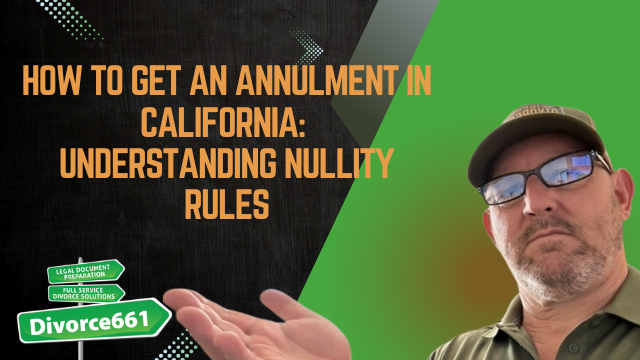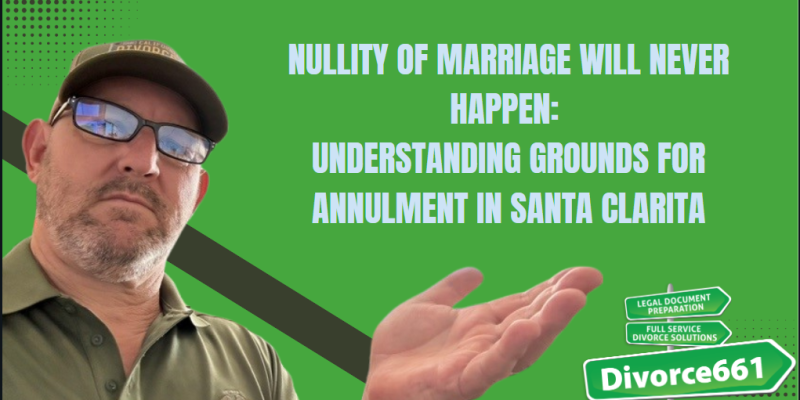How To Get An Annulment In California: Understanding Nullity Rules
Hi, I’m Tim Blankenship from divorce661.com. Today, I want to clarify some common misconceptions about annulments—also known as nullities—in California. While many people believe that a short marriage automatically qualifies for annulment, the reality is quite different here in California. If you’ve been recently married and are considering whether an annulment is possible, this guide will walk you through the facts and explain the specific grounds under which a marriage can be legally voided.
Annulment vs. Divorce: What’s the Difference?
First off, it’s important to understand that an annulment legally declares that a marriage never existed, whereas a divorce ends a valid marriage. Many people think that if their marriage was short—maybe just a few days or weeks—they can simply annul it. This is a common misconception fueled by TV shows and movies like The Hangover, where quick Vegas weddings are often portrayed as easily annulled the next day.
In California, however, the length of the marriage is not a factor for annulment. Whether you’ve been married for four days or four years, time alone does not qualify you for a nullity. If the marriage does not meet the specific legal reasons for annulment, your only option is to file for a divorce.
Six Legal Grounds for Annulment in California
So, what exactly are the reasons you can ask a court to nullify a marriage in California? There are six specific grounds, and they all require court approval. Unlike divorce cases based on irreconcilable differences, annulments require you to prove your case in a hearing. Here’s a breakdown of the six grounds:
- Age at Time of MarriageIf a party was under 18 years old at the time of the marriage or domestic partnership registration and did not have proper legal consent, the marriage can be annulled. Essentially, this means the person was not legally capable of entering into a marriage contract.
- Prior Existing MarriageThis is by far the most common and the only ground I’ve personally seen successfully used for annulments. If one party was already married and had not finalized their divorce before entering into the new marriage, the second marriage can be voided due to the preexisting marriage.
- Unsound MindIf one party was mentally incapacitated or unable to understand the nature and obligations of marriage at the time of the union, the marriage may be annulled. This might apply in cases such as intoxication or severe mental illness, but proving this in court is challenging.
- FraudIf one party was deceived into marriage by fraud that directly affected their decision to marry, the marriage can be annulled. Examples include marrying solely for immigration benefits (like obtaining a green card) or misrepresentations about the ability to have children.
- ForceIf a party was forced or coerced into marriage without their free and voluntary consent, the marriage can be annulled.
- Physical IncapacityThis old-fashioned ground refers to a situation where one spouse is physically incapable of consummating the marriage. Though it may sound outdated, it remains on the books as a valid reason for annulment.
Why Time Doesn’t Matter for Annulments in California
One of the biggest surprises for many people is that the short duration of a marriage is not a valid reason for annulment. I often get calls from individuals who have been married only a few days or weeks and want their marriage nullified because they feel it was a mistake. Unfortunately, California law does not consider a short marriage a sufficient ground for annulment.
For example, just the other day, a young woman called me after being married for four days, hoping to have her marriage nullified. I had to explain that despite the short time frame, she would have to proceed with a divorce instead. Sometimes, you just have to chalk it up to a life lesson.
What to Expect When Seeking an Annulment
Annulments are not automatic or simple. Because each of the six grounds must be proven in court, you’ll need to prepare for a hearing where a judge will decide whether your case qualifies for nullification. If the court finds that your grounds don’t meet the legal criteria, your annulment petition may be dismissed, and your case will proceed as a divorce instead.
Final Thoughts
If you’re considering annulment in California, understand that it’s a legal process with strict requirements. The shortness of your marriage alone won’t qualify you for a nullity. Instead, you must have one of the six specific grounds, and be prepared to prove your case in court.
If you find yourself in this situation or need guidance on annulments or divorce anywhere in California, feel free to reach out. At divorce661.com, we handle thousands of cases each year and are here to help you navigate the process.
Contact us at 661-281-0266 to discuss your case and get the support you need.



